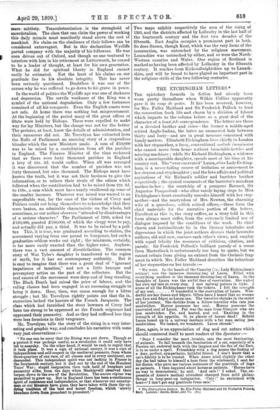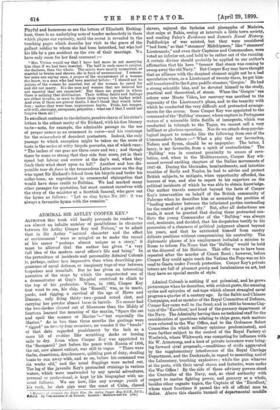THE ETCH1NGHAM LETTERS.* THE epistolary formula in fiction had already
been worn pretty threadbare when Wilkie Collins apparently gave it its coup de grace. It has been reserved, however, for Mrs. Fuller Maitland and Sir Frederick Pollock to lend the convention fresh life and charm by a division of labour which imparts to the volume before us a great deal of the character of a bona-fide correspondence. The letters are those of a devoted brother and sister—the former a middle-aged retired Anglo-Indian, the latter an unmarried lady between thirty and forty—and are in great measure concerned with family matters. Elizabeth Etchingham lives chiefly in London with her stepmother, a fussy, conventional malade imaginaire who cannot move from home without bronchitis-kettles and mincing-machines ; while Sir Richard Etchingham, a widower with a marriageable daughter, spends most of his time at rhj country seat. The "ever enervated" Laum, ias Lady Etching- ham; is a never-failing source of irritation or amusement to her stepson and stepdaughter ; and the love affairs and political aspirations of Sir Richard's soldier and barrister brother respectively ; the cynical comments of the barrister's mundane mother-in-law ; the courtship of a pompous Baronet, Sir Augustus Pam pesford—who after vainly laying siege to Miss Etchingham's heart eventually consoles himself with her step- mother—and the martyrdom of Mrs. Newton, the charming wife of a querulous, selfish retired officer,—these form the chief materials for the narrative portion of the letters.
Excellent as this is, the story suffers, as a story told in this form always must suffer, from the extremely limited use of dialogue imposed by the conditions of the work. Its chief charm and verisimilitude lie in the literary interludes and digressions in which the joint authors discuss their favourite authors, old and new canvass each other's views, and employ with equal felicity the resources of criticism, citation, and parody. Sir Frederick Pollock's brilliant parody of a scene from Maeterlinck is unfortunately too long to quote, but we cannot refrain from giving an extract from the Ossia,nic frag- ment in which Mrs. Fuller Maitland describes the behaviour of her stepmother on her travels :— " We went. In the hands of the Camelry [i.e., Lady Etchingham's retinue] was the immense dressing-bag of Laura. Filled with everything needless is the immense dressing-bag of Laura. In the thoughts of Laura was the awful fear of enervation. She waked her own sad tale at every step. I met railway porters in fight. I alone of all the Etchinghams took the tickets. I felt the strength of my soul 0 wonderful is the enervation of Laura. Won- derful are her fusses and fidgets. Often have I heard that no woman can fuss and fidget as Laura can. The traveller shrinks in the midst of her journey. She shrinks from a fellow-traveller who eats jam sandwiches. Horror possesses her soul. Horror possesses the enervated soul of Laura. Fat was the man from Glasgow who ate jam sandwiches. Fat, and heated, and red. 'Exulting in the strength of his appetite. 0, ye ghosts-of heroes dead! Behold Laura boxed up in a railway carriage with 's fat man eating jam sandwiches. We looked, we wondered. Laura shrank."
Here, again, is an appreciation of dog and cat nature which Should commend itself to most readers of the Spectator :— " Dogs I consider the most ,lovable, cats the most fascinating, of animals. To fall beneath the fascination of a cat, especially of a Persian cat, endowed both with the languor and the fire of the East, is to be under a spell. Friendship with a dog means the finding of a dear, perfect, sympathetic, faithful friend. I don't know that a cat's fidelity is to be trusted. When Azore ailed slightly the other day (he had taken to himself a ham from the sideboard), I sent for his doctor, who gave me various instances of the gratitude of 'dogs as patients. I then inquired about horses as patients. 'Horses have no way to demonstrate,' he said. And cats ? ' I asked. The ex- pression of Azore's medical attendant changed from mild philan- thropy to long-pent-up indignation. 'Cats he exclaimed with
heat= I don't get any gratitude from cats.' " • • The Etehingham Letters. By Ella Fuller Maitland and Sir Frederick Pollock, Bart. London : Smith, Elder, and Co. [Bs.]
Playful and humorous as are the letters of Elizabeth Etching- ham, there is an underlying note of tender melancholy in them which piques our curiosity, until the secret is revealed in the touching pages which describe her visit to the grave of the gallant soldier to whom she had been betrothed, but who lost his life by a gun accident on the eve of their marriage. We have only room for her final comment :- "Mrs. Vivian would say that I have had more in not marrying him than if we had been married. The half in such cases is greater, she declares, than the whole. The saints were mostly unmarried, or married to brutes and shrews, she is fond of announcing. I remem- ber some one saying once, a propos of the engagement of a woman she knew, to a man who had been married before : I should not be jealous of the woman he married, but of the woman he cared for and did not marry. It's the men and women that are beloved but not married that are canonised.' But there are people in whom there is nothing that disillusions. Their trifling faults and failings are either lovable, or seem to throw their virtues into higher relief. And even if there are graver faults, I don't think that would inter- fere; unless they were base, ungenerous faults. Pride, hot temper, self-will, obstinacy, arrogance, prejudice ; what am I that I could not forgive them all 2" In excellent contrast to the delicate, pensive charm of his sister's letters is the robust sanity of Sir Richard, with his fine literary tag te—note, for example, the admirable passage on the use of, proper names as an ornament in verse—and his contempt for the minauderie of decadent poetasters. Indeed, the only passage to which exception might be taken on the score of taste is the series of witty bicycle proverbs, one of which runs: "The inches of our gear are three score and ten ; and though there be some so strong that they ride four score, yet in their speed but labour and sorrow at the day's end, when they fetch their wind short upon an hill." Another and less dis- putable tour de force is the tremendous Latin curse on the dog who upset Sir Richard's friend from his bicycle and broke his collar-bone, an experiment in ornamental objurgation that would have done credit to Politian. We had marked many other passages for quotation, but must content ourselves with the story of the minister at a Scottish funeral, who gave out the hymn as follows : "Let us sing hymn No. 297: it was always a favourite hymn with the remains."























































 Previous page
Previous page